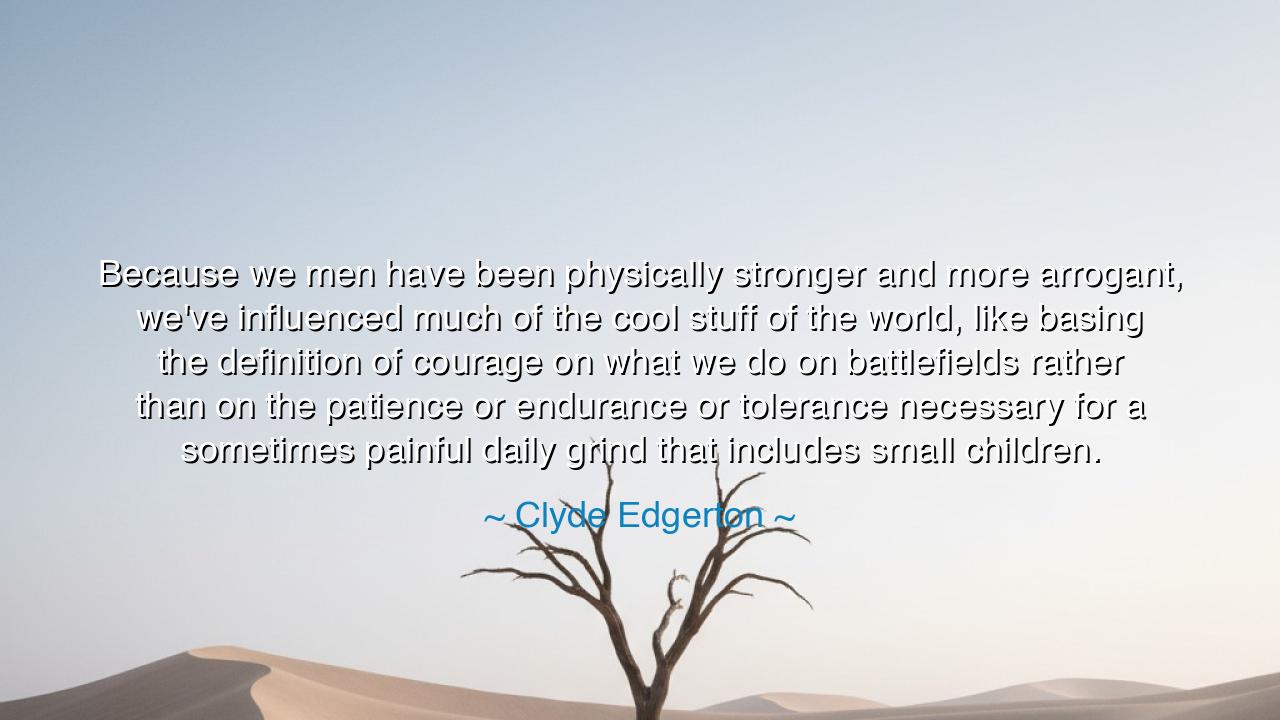
Because we men have been physically stronger and more arrogant
Because we men have been physically stronger and more arrogant, we've influenced much of the cool stuff of the world, like basing the definition of courage on what we do on battlefields rather than on the patience or endurance or tolerance necessary for a sometimes painful daily grind that includes small children.






In this deeply reflective saying, Clyde Edgerton reveals a truth that pierces the armor of traditional heroism: “Because we men have been physically stronger and more arrogant, we've influenced much of the cool stuff of the world, like basing the definition of courage on what we do on battlefields rather than on the patience or endurance or tolerance necessary for a sometimes painful daily grind that includes small children.” His words strip away the illusions of glory that history has wrapped around masculine courage and restore honor to the quieter, uncelebrated forms of strength — those found not in conquest, but in compassion; not in war, but in care.
The origin of this thought lies in Edgerton’s reflections on culture, masculinity, and the human condition. A novelist and observer of ordinary lives, he recognized how society has long exalted heroism in war and strength in dominance, while overlooking the everyday courage of those who nurture, persevere, and sacrifice in silence. In this, he exposes a long-standing imbalance: men, by virtue of physical power and social privilege, have shaped the very language of courage — defining it by the clash of swords, the thunder of guns, and the roar of victory. Yet, he reminds us that endurance, patience, and tolerance — virtues often embodied by women and caretakers — demand no less bravery, though they are rarely praised.
Through these words, Edgerton challenges us to broaden our understanding of what it means to be brave. For what is courage if not the strength to face hardship, fear, or pain without surrender? The soldier who stands amid fire is brave, yes — but so, too, is the mother who rises each morning to care for her children, even when her body is weary and her spirit frayed. So is the father who stays through the difficult seasons of family life, guiding with gentleness rather than authority. True courage, Edgerton implies, is not measured by the noise of deeds, but by the quiet consistency of love that persists through fatigue, frustration, and sacrifice.
History itself bears witness to this hidden heroism. Consider Florence Nightingale, who entered the filth and fever of wartime hospitals not with a sword, but with a lamp. She transformed the meaning of bravery — from one who takes life to one who preserves it. Or think of Nelson Mandela, who endured twenty-seven years of imprisonment not with bitterness, but with forgiveness — showing the world that courage can reside not in resistance alone, but in restraint. Their endurance, patience, and compassion were no less powerful than the courage of generals or kings. They embodied the truth that strength of spirit often outweighs strength of body.
In Edgerton’s reflection, there also lies a warning about arrogance — the kind that blinds men to gentler forms of greatness. By exalting conquest, we have narrowed the definition of virtue. We have taught our sons to be brave in conflict but ashamed of tenderness. We have told them to fight battles abroad, but not to stay and fight for harmony at home. Yet, as the world grows weary of division, it is the courage of empathy that becomes most needed — the courage to listen, to nurture, to build rather than destroy. The battlefield of the modern soul is not a field of war, but the heart that dares to remain kind in an unkind age.
The lesson, then, is clear: we must redefine courage. Let it no longer be confined to the clash of nations or the glory of victory. Let it also live in the teacher who patiently guides a child, the nurse who tends the dying, the parent who chooses understanding over anger, the worker who endures hardship without losing dignity. These are the quiet heroes who uphold the world. Their valor is unrecorded, but it sustains life itself.
So, my child, remember this: to be truly courageous is to be steadfast in love and gentle in strength. Do not seek valor only in the grand gesture, for courage is not always loud. Sometimes, it is the quiet voice that says, “I will try again tomorrow.” Sometimes, it is the patience to hold another’s pain without turning away. The world does not need more warriors of destruction; it needs warriors of compassion — those who have the endurance to keep loving, to keep nurturing, even when the heart is tired. For in that daily, unseen labor lies a courage greater than any found on the battlefield — the courage that sustains the very fabric of humanity itself.






AAdministratorAdministrator
Welcome, honored guests. Please leave a comment, we will respond soon